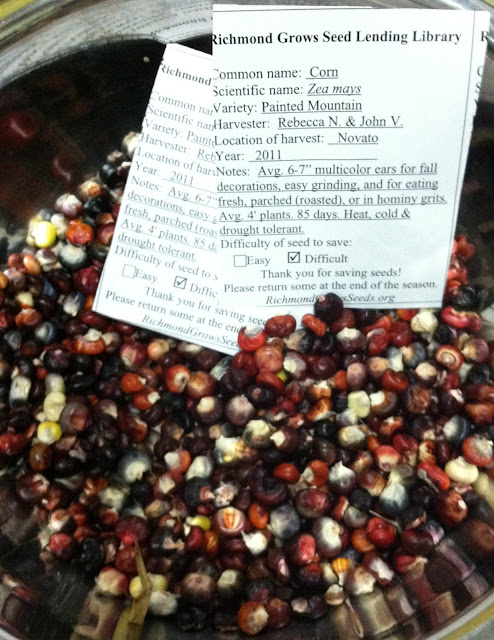I went to the seed swap at the Berkeley Ecology Center last year, and it was a blast. Potluck, meeting other local gardeners and urban farmers, and a whole room full of free open-pollinated and heirloom seeds, many for varieties I'd never heard of.
Some of the seeds came from local seed libraries, while others were commercially grown packets that people hadn't gotten around to using, or didn't use up. This is one of my favorite things about both seed swaps and seed libraries. In a little urban garden, a packet of 30 seeds is often too many. You don't have room for thirty tomato plants, and certainly don't want that many of the same variety (unless you want your entire summer's harvest to ripen the same week).
Seed swaps and seed libraries let you take home just the seeds you need. Signs at the swap suggested 2-3 seeds for each plant you want, to allow for some not sprouting. This means you can easily try a lot of different varieties, without buying and wasting 90% of the seeds in each packet. After last year's seed swap, I grew four kinds of cucumbers, eight kinds of tomatoes, six kinds of peppers, and so on. It turns out that some of the results weren't quite what I'd hoped for, but that's okay: I had plenty of other ones to choose from.
(Sorry about the quality of the photos; I took them with my phone.)
(Sorry about the quality of the photos; I took them with my phone.)
What's a seed lending library?
Seed libraries preserve heritage seed stock while making it easier for people to grow their own food. Members can "check out" seeds from the library. At the end of the season, you let some of your plants go to seed, then bring some of those next generation seeds back to the library for other people to grow the following year.
Most libraries have workshops or resources that teach you how to save seeds, make sure your plants don't get cross-pollinated by other varieties, and more. The quality of the library's seeds depends on members saving them properly; otherwise your "spaghetti squash" seeds might grow into a zucchini-spaghetti hybrid. Libraries usually recommend you start with varieties that don't cross-pollinate easily, until you get the hang of it. Two local seed lending libraries have videos online, and you can find many others on youtube.
Richmond Grows Seeds has videos in english and español at: http://www.richmondgrowsseeds.org/
The Bay Area Seed Lending Library has videos at: http://www.ecologycenter.org/basil/
Most libraries have workshops or resources that teach you how to save seeds, make sure your plants don't get cross-pollinated by other varieties, and more. The quality of the library's seeds depends on members saving them properly; otherwise your "spaghetti squash" seeds might grow into a zucchini-spaghetti hybrid. Libraries usually recommend you start with varieties that don't cross-pollinate easily, until you get the hang of it. Two local seed lending libraries have videos online, and you can find many others on youtube.
Richmond Grows Seeds has videos in english and español at: http://www.richmondgrowsseeds.org/
The Bay Area Seed Lending Library has videos at: http://www.ecologycenter.org/basil/
In addition to offering unusual or especially delicious varieties that are well-suited to your local microclimate, seed libraries are a critical part of preserving genetic diversity. Plant varieties all over the world are going extinct, thanks to a monoculture-focused agricultural industry and the replacement of open-pollinated and heirloom varieties with hybrid and GMO seeds. Without the genetic diversity of a wide variety of plant species, our food supply becomes more and more vulnerable to disease and pests. This increases reliance on pesticides and insecticides, or leads to crop failure and famine.
There are seed libraries all over the world — run by public libraries, environmental groups, garden clubs, or individuals. Some have small membership fees, and many are free. To find seed libraries in your area, search for "seed library" and the name of your town and state, or browse the listings at:
Seed swaps
Don't have a seed lending library in your area, or just not ready to try seed saving? Organize a seed swap with local gardeners, or see if your local library or farmer's market has some table space for a sign and a basket.
Support heirloom seed growers
Of course, you can also support the cause by purchasing your seeds from seed saving organizations or from commercial seed growers and nurseries who grow heirloom and open-pollinated varieties. Look for the words "heirloom" or "open-pollinated" on the package, and avoid any that say "F1" or "Hybrid".
Event Details
Bay Area Seed Interchange Library (BASIL) 14th Annual Seed Swap
Potluck supper, hoe down music, home-grown garden seeds, and the company of fantastic local gardeners! Come learn about seed saving classes and the Library. BASIL is a project of the Ecology Center.
- Date: Friday, February 15, 2013
- Time: 7pm - 9pm.
- Where: Ecology Center, 2530 San Pablo Ave, near Dwight Way, Berkeley.
- Cost: food and seeds to share or $10 donation.
- Info: 510-548-2220 x233, basil@ecologycenter.org, http://www.ecologycenter.org/basil/.
- Wheelchair accessible.




